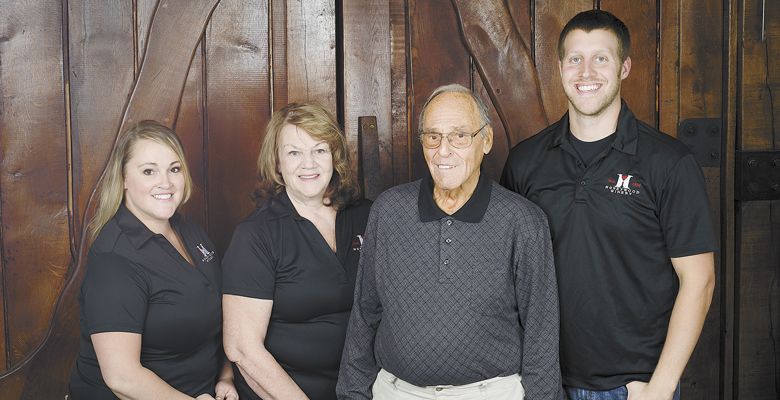Honoring Mr. Honeywood
Enthusiastic owner remembered fondly by family, friends, customers
Lesley Gallick receives many e-mails and calls from people who found an old bottle or two of Honeywood wine, stashed away in some back corner of the basement of an old house they recently bought in Salem or somewhere else.
“What’s it worth?” they’ll ask.
“Um, not much?” she says with a laugh, referring to the price tag.
But, to the Gallick family, these dusty bottles mean more than all the money in the world; they reveal the rich history of Oregon’s oldest continuously operating winery and the family’s part in its modern day success.
The day after the 21st Amendment was ratified, Dec. 5, 1933, formally ending Prohibition, the winery received its license, which went into effect Jan. 1, 1934; it was designated bond No. 26 — for reference, HillCrest, Oregon’s oldest continuously operating estate winery, holds bond No. 44.
Lesley is Honeywood’s marketing and retail store manager in Salem as well as daughter to Marlene Gallick, the winery’s vice president, and Paul Gallick, the banking executive from Minnesota who bought controlling shares in Honeywood in 1972, ultimately assumed the role of sole proprietor; he died in December of last year at the age 87.
Born in Minneapolis, he secured his first job, a paper route, at the age of 9, and later worked for the railroad at 12. After serving in the U.S. Army, he earned a degree in economics through the University of Minnesota. His education continued through the school’s Graduate School of Banking and Minnesota Institute of Banking. He soon became the youngest president of several banks in Minneapolis.
One of Paul’s joys, aside from business, was meeting customers at Honeywood. As a testament to his influence and personality, people would visit the winery constantly asking for him.
“People knew him as Mr. Honeywood,” Marlene said. “He remembered them by name, knew where they were from, and other tidbits about them and their lives. It was very impressive.”
Paul would share stories, wit and his signature “dad” jokes from across the bar; behind it, he stashed a little TV so he could watch golf and other sports.
“That drove wives crazy,” laughed Marlene, “because here they were trying to get out and do something with their husbands, and then their husbands discover Paul’s got the game on or golf, and they were thrilled.”
Lesley added, “He loved going to work every day and put his heart and soul into it. He literally work seven days a week, breaking only for golf, playing his piano or something to do with his grandkids. He loved every customer and got excited to see them and his friends within the industry.”
The winery has always been a part of Lesley’s life, while some of her siblings recall the Minnesota years, when Paul ran several banks, and owned a couple other businesses.
“I had to learn about carpeting, and then I had to learn about spray foam,” said Marlene, recalling the ventures she and Paul undertook together. “I don’t know what put an Oregon winery on the table...”
Whatever it was, it worked. Under Paul’s leadership, Honeywood founded the Salem Wine Festival in 1980. Today, the winery produces 30,000 cases each year, crafting wine grape varietal wines as well as fruit wines, reflecting the winery’s beginnings, when Salem was the cherry-growing capital of the world.
Considering Honeywood’s heritage, Marlene says Oregon has a wine history before the 1970s, referencing the rush of new vineyard owners who settled here during that decade, establishing the state’s wine country. But for Honeywood, initially called Columbia Distilleries and later named after founders Ron Honeyman and John Wood, the origins of the business reach back somewhat further.
The winery was boosted to a new level by Mary Reinke, starting as a secretary with the company who then saved it from bankruptcy in 1961 when she promoted wine not only as a complement to meals, but also an ingredient in fine cooking. Reinke was also instrumental in changing legislation, allowing Oregon wineries to sell bottles in tasting rooms — previously, all they could do was refer delighted tasters to retailers — Marlene enjoys that story. Reinke sold the company to Paul in 1972.
The company’s origins are enshrined in the massive doors throughout the winery, all redwood taken from the 10,000-gallon casks originally used for fermentation.
Today, Paul’s family operates Honeywood, maintaining a large gift shop and a dizzying array of wines. Along with Cabernet Sauvignon, Merlot, Marechal Foch and rosé, you’ll find peach, loganberry, pear, apricot, blackberry, cranberry with orange, cherry and pomegranate wine, to name a few.
“My dad was a visionary in the wine industry breaking stereotypes and stigmas of fruit wines,” said Lesley. “He created wines like Cranberry L’Orange, Currant Noir and Blackforest before blending fruit and varietal were the ‘in’ thing to do.”
Honeywood has planned a celebration of Paul’s life on March 11 at the Salem Golf Course. He is survived by wife, Marlene; children, Edward, Susan, Matthew, Jennifer, Lesley, Kyle and Kaylene; as well as numerous grandkids and great-grandchildren.











